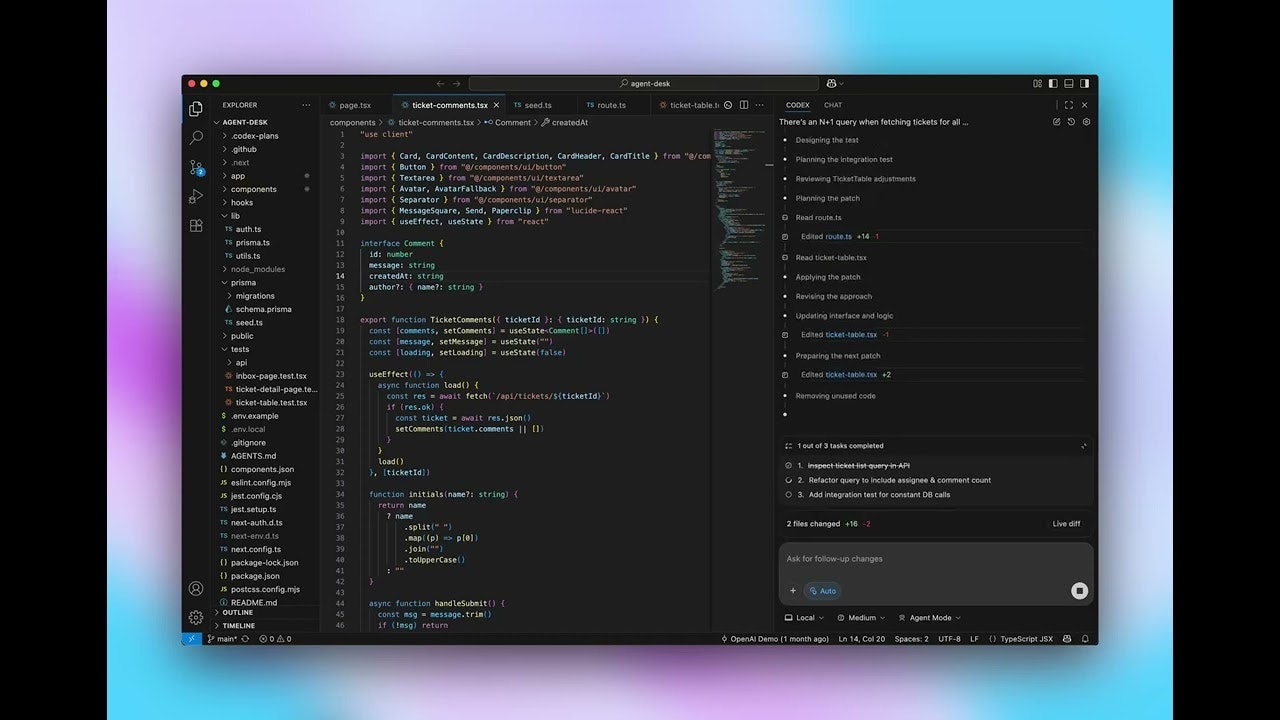Table of Contents
Overview
In the rapidly evolving world of AI-powered development, having an intelligent assistant that can truly understand and execute complex coding tasks represents a significant advancement in software engineering. Enter Codex, the powerful AI coding agent available with ChatGPT Pro, Business, and Enterprise plans, with Plus access rolling out progressively. Designed to be your comprehensive agent for everywhere you code, Codex promises to revolutionize your development workflow by seamlessly integrating into your development environment and handling a wide array of coding challenges with unprecedented autonomy.
Key Features
Codex comes equipped with advanced capabilities designed to enhance every stage of your development lifecycle. Here’s what it offers:
- Pair Programming in Terminal/IDE: Experience intelligent pair programming directly within your terminal or integrated development environment, with native support for VS Code, Cursor, Windsurf, and other popular editors, enabling real-time assistance and autonomous code generation.
- Cloud Delegation: Delegate complex coding tasks to secure cloud sandboxes, freeing up your local resources and enabling parallel processing for faster results while maintaining isolation for security.
- Automatic Code Reviews: Benefit from AI-powered automatic code reviews that identify potential issues, suggest improvements, and ensure code quality standards without manual oversight.
- GitHub Integration: Seamlessly integrate with GitHub workflows, streamlining version control, automated pull request creation, and collaborative development processes.
- Mobile Access via ChatGPT App: Stay connected to your coding projects even on the go, with full mobile access to Codex functionalities through the ChatGPT iOS app.
How It Works
Codex operates with remarkable autonomy and intelligence, making it an invaluable development partner. When assigned a task, Codex autonomously navigates through your repositories to edit files, execute commands, and run tests as needed. This entire operation takes place within isolated cloud sandboxes powered by OpenAI’s o3 model, ensuring security and preventing conflicts with your local environment. Crucially, it maintains seamless synchronization across both your local and cloud environments, so your work remains up-to-date and accessible wherever you are working.
Use Cases
The versatility of Codex makes it suitable for a comprehensive range of development scenarios. Here are key ways you can leverage its capabilities:
- Autonomous Task Execution: Assign complete coding tasks, from feature implementation to bug fixes, allowing Codex to work independently while you focus on higher-level architectural decisions and strategic planning.
- Accelerated Code Reviews: Significantly speed up the code review process by having Codex perform thorough initial analysis and highlight areas for improvement with detailed explanations.
- Solution Architecture: Use Codex as an intelligent brainstorming partner, generating different approaches and comprehensive solutions to complex technical problems.
- End-to-End Development: Let Codex handle complete development cycles from planning through implementation, testing, and pull request creation.
- Mobile Development Support: Access and work on your codebases directly from your mobile device via the ChatGPT app, enabling productivity from anywhere.
Pros \& Cons
Advantages
Codex brings several compelling benefits for modern development teams:
- Seamless integration across all development platforms, from terminal to IDE and mobile environments.
- Significantly boosts productivity through autonomous task execution and intelligent assistance that goes beyond simple code completion.
- Offers a comprehensive agentic coding experience, handling complete development workflows from conception to deployment.
- Advanced security through isolated cloud environments and enterprise-grade safeguards.
Disadvantages
While powerful, there are important considerations:
- Requires an active ChatGPT Pro, Business, or Enterprise subscription, with Plus access still rolling out.
- Performance is dependent on cloud connectivity and OpenAI’s infrastructure availability.
- Learning curve for teams transitioning from traditional code completion tools to autonomous agent workflows.
How Does It Compare?
When evaluated against the current landscape of AI coding tools in 2025, Codex distinguishes itself as a comprehensive autonomous agent rather than a traditional code completion tool.
GitHub Copilot remains a leading solution with both code completion and agent capabilities, priced at \$10-19 monthly. While it excels at in-line suggestions and now offers agent mode for task completion, its primary strength still lies in code completion and chat-based assistance.
Cursor has emerged as a popular AI-native editor priced at \$20 monthly, built specifically around AI workflows. It offers fast response times and seamless AI integration but focuses on enhancing the traditional coding experience rather than autonomous task execution.
Windsurf provides collaborative AI-powered development with pricing from \$15-60 monthly, excelling at multi-file editing and real-time team collaboration, positioning itself as an AI-enhanced IDE experience.
Claude Code offers advanced reasoning capabilities at \$20 monthly with multimodal support, appealing to developers requiring sophisticated problem-solving assistance.
Amazon CodeWhisperer targets AWS developers with security scanning and deep AWS integration, priced from free to \$19 monthly, making it ideal for cloud-native development.
Replit Ghostwriter provides zero-setup browser-based development with real-time collaboration, priced from free to \$20 monthly, perfect for educational use and rapid prototyping.
Codex’s primary differentiator lies in its autonomous agent capabilities powered by OpenAI’s most advanced o3 model. While competitors excel in specific areas like code completion, IDE integration, or specialized workflows, Codex offers comprehensive end-to-end task automation, from understanding requirements to implementing solutions, running tests, and creating pull requests. This positions it as a development partner rather than just an assistant, making it particularly valuable for teams seeking to automate entire development workflows while maintaining high code quality standards.
Final Thoughts
Codex represents a paradigm shift in AI-powered development, offering an autonomous, intelligent, and highly capable coding agent that extends far beyond traditional code assistance. Its ability to seamlessly integrate across development environments while providing comprehensive agentic capabilities makes it an invaluable tool for development teams looking to fundamentally transform their productivity and workflow efficiency. While the subscription requirement and cloud dependency are considerations, the comprehensive feature set and autonomous capabilities make it a compelling choice for professional developers and teams ready to embrace AI-driven development workflows. As the industry moves toward more autonomous development tools, Codex positions itself at the forefront of this evolution, offering a glimpse into the future of AI-assisted software engineering.
https://openai.com/codex/